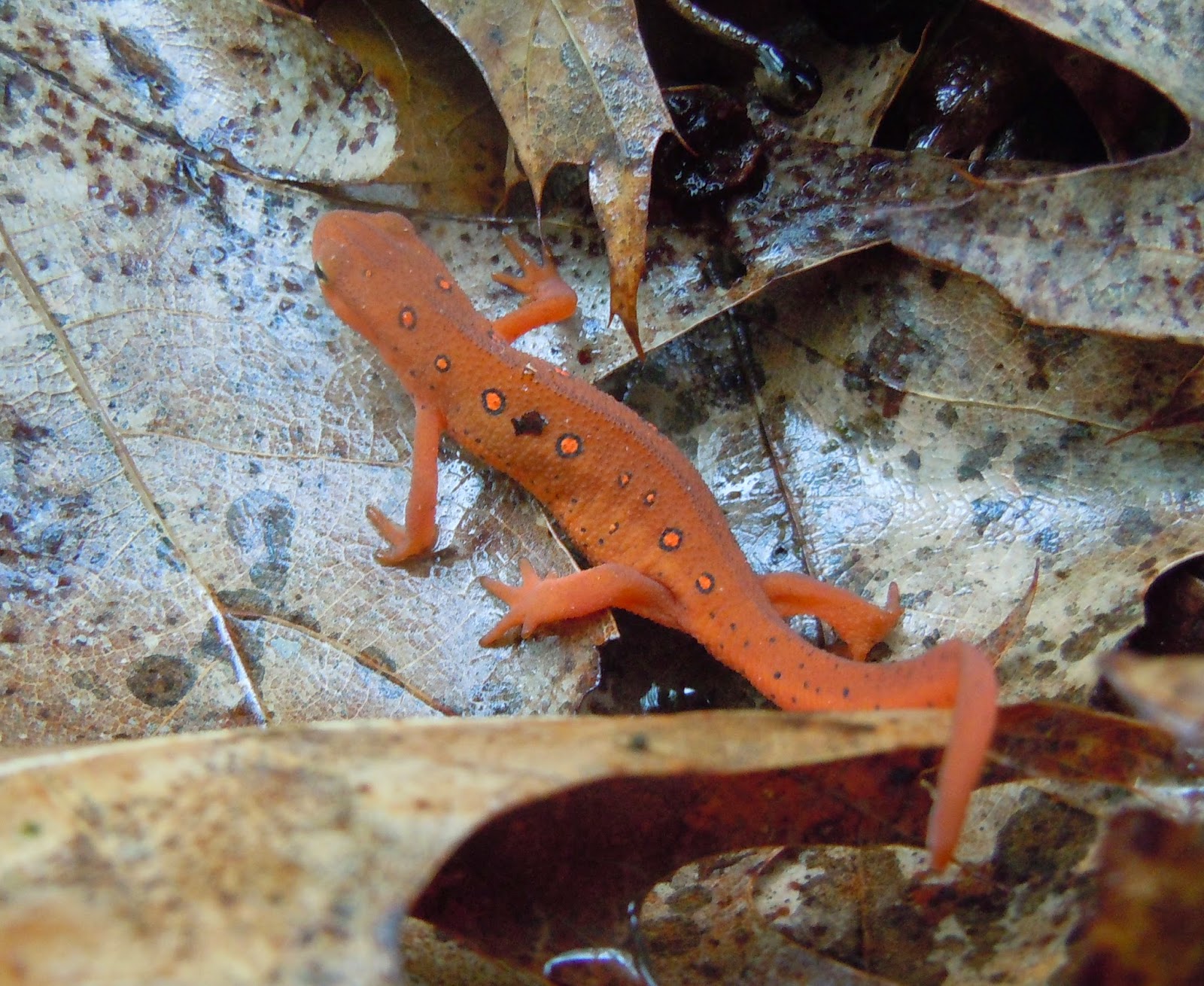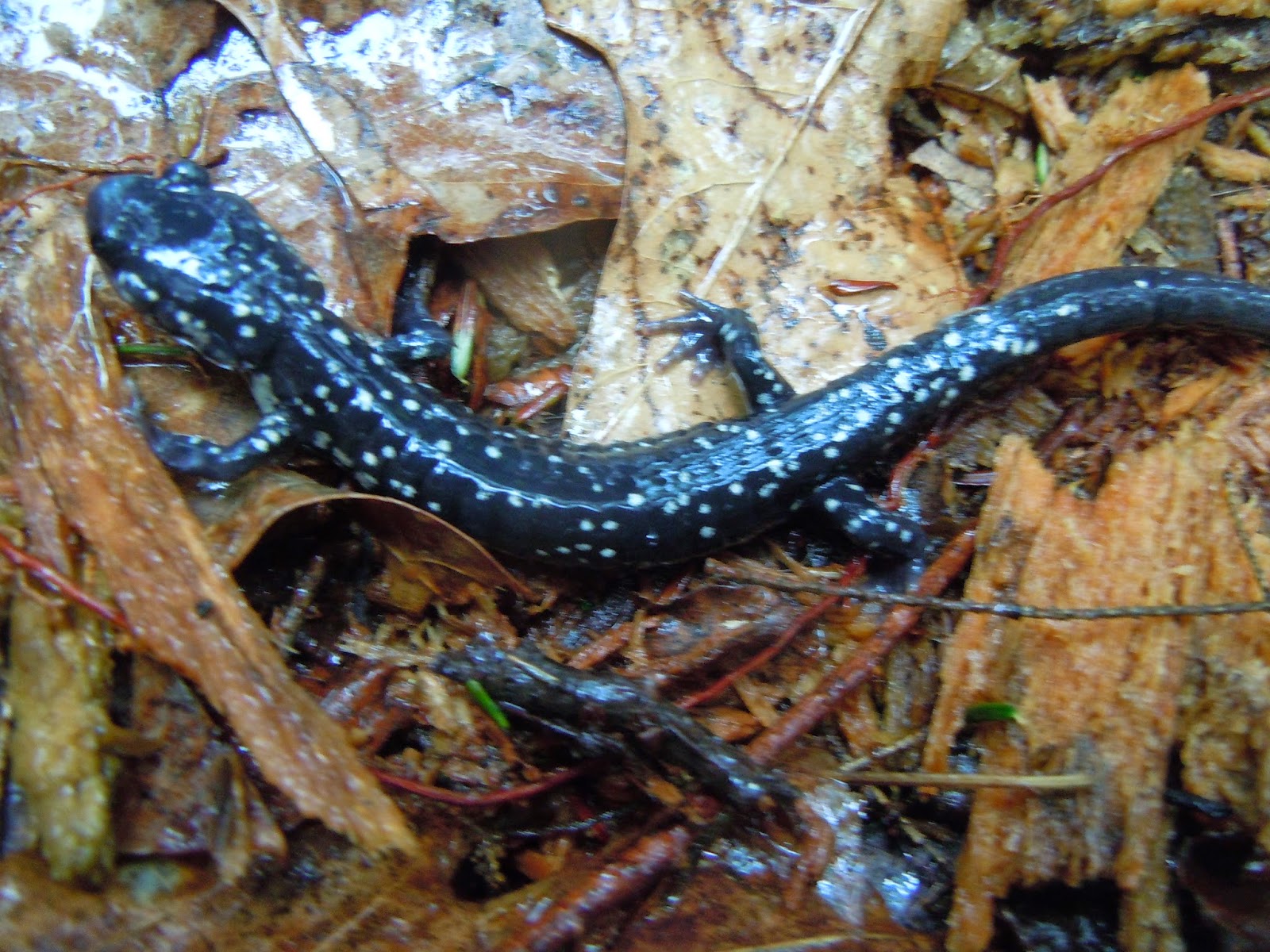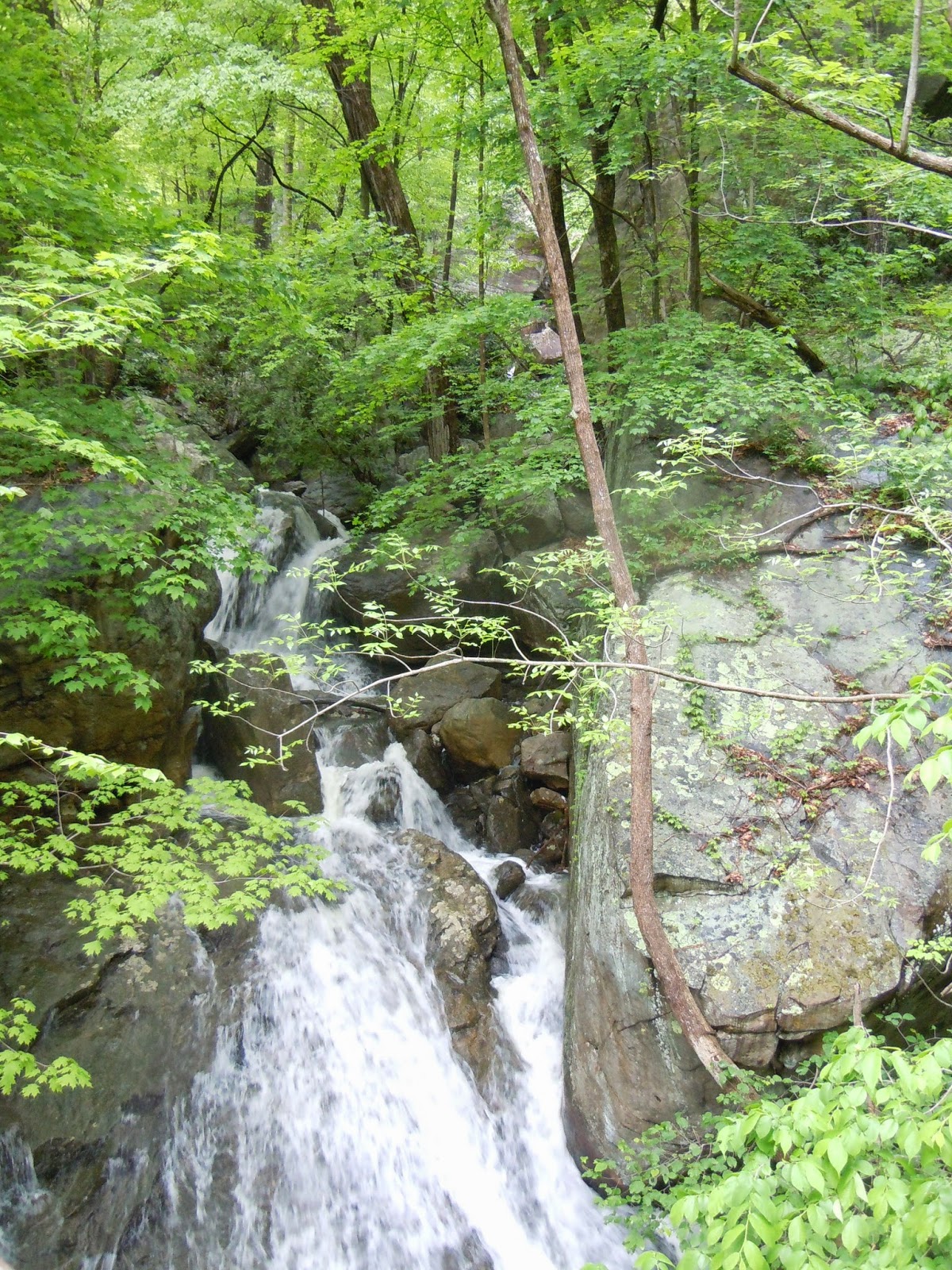Y’all can park your asses on a warm beach in Mexico if you want to, but I’m going to vacation in West Virginia. I’m going to the New River Birding And Nature Festival for the third time, and the birds are plenty compelling–particularly there, where I will be surrounded by people who will point them out for me and hang little name tags on them–but I’m in it for the Nature part too. Especially the salamanders. I stand second to no one in my admiration for salamanders (a.k.a. the crown of Creation). I will be the one rolling logs while everyone else is looking up. There is no place on earth with a greater diversity of salamanders than the southern Appalachians. There’s a reason for that.
These mountains have been in the works for a very long time. They started to rise up 480 million years ago and really hit their stride when Africa plowed into the eastern shore of North America, which, as you might imagine, wrinkled things up something fierce. Everything got folded up and pleated and shoved around, and then eroded, so that now you can find wildly different kinds of deep, rich soil in close proximity: sandstone ridges proud with pines right next to limestone soils sprouting the finest
hardwood forests anywhere, everything imaginable growing side by each.
It’s just an accident of plate tectonics that the whole series of ridges and valleys runs north-south. Shitty arrangement if you’re an American pioneer with your heart set on going west and displacing natives, but terrific if you’re a northern species trying to contend with the ice ages. If an ice sheet is bearing down on you, it’s an easy slide south down the valleys. If it retreats, you can go back, or you could just pop up-mountain and hang out in the coolth. By the time the ice ages petered out, all kinds of plants and animals had migrated to the southern Appalachians and found a home somewhere in the rumpled landscape.
The festival is in the New River Gorge area. Our pioneers named the river New because it just sort of showed up without being formally introduced on any of their maps, but it is not only not new, it’s, like, the third oldest river in the world. There’s a crazy amount of water in these hills. Bright, fresh water. Pure treasure.
One of the draws of this place for a birder is the fact that a whole sparkle-box of warblers wants to come here for Spring Break to get lucky. They’re all dressed up in their finest and they’re singing their fuzzy little hearts out and they’re horny and they don’t care who’s watching, evidently. They’ve flown their tiny fannies all the way here from south or central America, hundreds of miles, and in many cases they have flown directly to the same tree they were in last year. Sometimes the tree isn’t there. Sometimes the forest isn’t there.
Sometimes the mountain isn’t there.
Sometimes the whole damn range is gone. Sadly, some of the bits that got folded up in the mountains are fossilized peat bogs–coal–and the easiest way to get at it, in order to burn it all up, is to blow up the mountains and shove their carcasses into their own valleys. Sure, it’s like doing neurosurgery with a broadaxe, but it’s weirdly efficient, if you don’t give a damn about water, or plants, or animals, or life in general. Or the future.
Charleston citizens were rightfully incensed early this year when a chemical used in coal processing ruined their drinking water. Where, they demanded, was the government entity responsible for keeping their water safe? Many of those same people have spent years fighting those same government entities because if they were truly allowed to safeguard the environment, there wouldn’t be any mountaintop removal coal mining at all. And folks here want those jobs. They’re justifiably proud of the generations of miners who have all worked a hell of a lot harder than any of those hippies trying to shut them down. And for all the natural treasure surrounding them, they don’t have a Plan B. Coal mining is it.
Could be there won’t be much more mountaintop removal in Appalachia, but it won’t be because the EPA finally did their job. It will be because the coal companies have figured out they can get the stuff out cheaper in Wyoming. And they don’t give a damn about the miners left stranded. They never have. Not any more than they care about the salamanders, or their own grandchildren.




Where, they demanded, was the government entity responsible for keeping their water safe? Many of those same people have spent years fighting those same government entities because if they were truly allowed to safeguard the environment, there wouldn't be any mountaintop removal coal mining at all.
Hopefully they'll finally start connecting the dots.
The guys who run these coal companies deserve to get rear-ended by Africa the next time it goes caroming past. As do the Congressmen who hamstring the EPA because they listen to lobbyists. How did we end up with the de-facto weakest environmental protections in the developed world? The salamanders could do a better job.
May I hereby thank you for every word you just wrote.
seconded
I always enjoy adding new words to my vocalberry that I learn here at Murr's. 'Coolth' is my word for the day.
I lived in almost heaven by god West Virginia for my hippie years and the populace was conflicted by my 'return to the earth' attitude. They were trying desperately to escape the good old days by replacing them with the modern, which included mining jobs. I am saddened to know that they may be having their come to jesus moment too late for warblers and things that drink water and such.
A whole lot more of us than just the miners are going to be having that come to Jesus moment soon enough. And it will be too late. God, I'm on a downer! But it's sure purty here.
We just all need to learn to stop drinking water. Maybe we should just drink beer…
You know how many gallons of water you need to make one gallon of beer? I used to know, but I've suppressed it. Hard.
I'd never seen 'purple mountains majesty' until I was working in WV in the early spring. Back in the '80s, WV was about the prettiest, hardscrabble, poverty-stricken place I'd ever been. Watching the mountaintops being lopped off damn near broke my heart. Then I spent a month in Kentucky and died a little bit more.
If possible, they're even worse off. People with the misfortune of living on top of fossil fuel (or copper, or diamonds, or…) can never really prosper. And the ones scooping up the money are long gone.
On the bright side eventually WV will be as flat as Kansas and then the locals can start a new career – farming. Remember mother nature always wins.
They'll have to truck in one mothertruckload of soil.
I wrote a story once about my salamander.
http://esbboston.blogspot.com/2008/10/my-salamander-demander.html
I published it to my blog right before I lost my job. Perhaps they thought I was insane (?) and I reaLLy believed the contents of my story.
I have his cousin! He sits in my studio and holds down fabric and papers and stuff. Busy guy.
The Beatles song "While My Guitar Gently Weeps" seems appropriate.
Hugs, my darling.
This is not the first time in my life I've thought how hard it is to accommodate all the really necessary opposing needs of all the residents of our world. Humans and non-humans alike gotta eat/drink/shelter.
Enjoy your salamanders! Those pictures make them look just like the toy ones my kids loved to collect. When you're used to seeing the fake ones, the real ones look like the copies, not the other way around.
Somebody has been making toy salamanders? Seems so unlikely! And yet, hopeful.
Don't get too excited just because I forgot to tell you how long ago my kids were kids. These toy salamanders were in the little vending machines in the mall in the 90's. There were at least a dozen different kinds, a loonie ($1 Cdn coin) each. My son, in particular, liked them – he and I had found a real one (at least it looked like a salamander) under the leaves one fall. He wanted to keep it awhile (horrors, Murr, I know!) but it wouldn't eat the hamburger we read it could be fed, so "we" decided to let it go, right back where we found it. (did we do okay?) It was rather magical, and I never saw another one before or since.
How I wish that everyone would put their logs back. Which means not blowing it to smithereens (and further) to see what is underneath.
Another great post.
Bless yore bones, you got my title. And mostly, we should not even be rolling the suckers.
I can almost see the steam coming out of your ears. This is the dichotomy. If it makes money how can we stop doing it, even if it kills those we love!
It's a combination of the money and the comfort and the mass miseducation effort. No one with a proper perspective would do what we're doing. We assume we'll live forever and that's what we choose to believe.
If you don't have the backing of the coal companies you can't be a politician in Coal Country. We stew of money influencing politics – this is not new – it has gone on for ever throughout Appalachia.
the Ol'Buzzard
And everywhere else. It's particularly poignant in this gorgeous old land.
SOMEday I'll convince you to take a TWO-week vacation and spend the second week at The Biggest Week in American Birding. Northwest Ohio needs a dose of Murr. I'll buy the pie!
REally? I thought the biggest week was the same all over. I didn't know it was in NW Ohio! And I like pie.
I'm not sure if my comment took or not. I am glad you are going to my home state and that you recognize its beauty. I hate what the coal companies have done to it.
I'm guessing you aren't one of the residents who tosses all your trash around. What's up with that?
It seems that blowing up things is profitable, getting rid of rivers and streams is popular, and it all has made me sad since the 70s. Nothing seems to change. Remember John Prine?
I do. He's not dead yet, is he?
Ha Ha-coolth-Murr, you crack me up!
Very sad about the coal mining methods though and all those left stranded without jobs when the companies move on.
Any way you look at it these jobs ain't sustainable. In fact, EVERY way you look at it. You'd think the honchos would worry about something they can't keep up, but no.
It's a tragic circumstance, being poisoned by your community's lifeline. Both are real concerns, and sadly their opinions won't matter on either. Roth
What you said.
A volunteer fireman friend in Australia reports that a recent brush fire ignited an open-pit coal mine which has been impossible to extinguish. Whatcha gonna do when the very earth itself is burning?
I don't know how bad that one is, but there have been coal fires going for decades in this country. You can't put them out. Crapcakes, huh?